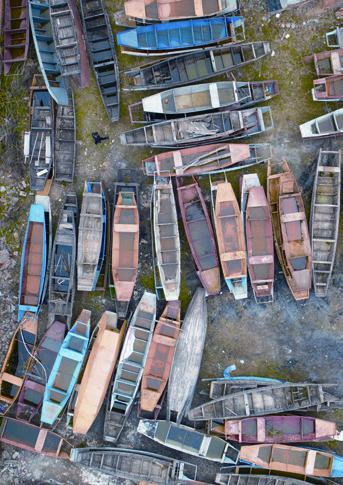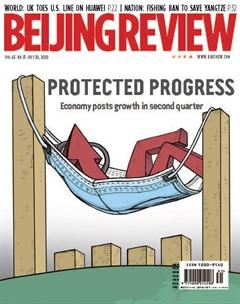Saving the Fish and The Fishermen
By Yuan Yuan


After bidding farewell to fishing, Zhao Zelun now spends more time on his farm and his newly renovated guesthouse on Zhongba Island in Chongqing Municipality in southwest China.
For nearly three decades, Zhao made a living as a fisherman on the Yangtze River. But in 2010, he started thinking of going offshore as the number of fish began to dwindle. When Zhao fi rst began fi shing in the early 1990s, it was a different story; he could easily catch hundreds of kilograms of fi sh in one trawling. But in recent years, he could hardly get one 10th of that.
“The money I earned from fishing dropped dramatically and I gradually realized that I couldnt count on the Yangtze for a living anymore,” Zhao told Chongqing TV. What sealed his decision was a 10-year ban on commercial fishing on the Yangtze announced by the Ministry of Agriculture and Rural Affairs (MARA) last year.
The scale of the ban is “unprecedented since it affects more than 100,000 fishing boats and nearly 300,000 fishermen,” Vice Minister of Agriculture and Rural Affairs Yu Kangzhen said at a news conference on January 1, the day the ban went into effect in 332 conservation areas in the Yangtze River basin. The ban will also be enforced in all natural waterways of the river and its major tributaries no later than January 1, 2021. It aims to improve the ecological environment and protect the biodiversity of the Yangtze.
Old men and the river
The Yangtze, stretching 6,300 km across China, winds through more than 10 provincial-level administrative regions. About 280,000 fi shermen living along the river depended on it for their livelihood.
Zhao received a notice about the ban in late 2018 and was one of the early birds to take swift action. He rented a small piece of farmland from local farmers and started planting sugarcane. Then he converted a house near the farm into a guesthouse with an overview of the Yangtze.
Zhao said since President Xi Jinping called for concerted efforts to protect the Yangtzes ecological environment from excessive development in early 2016, there has been great improvement.
Benefiting from conservation efforts, Zhongba has become a new tourist destination, attracting many guests to his guesthouse. “In the past, I relied on the fi sh in the Yangtze for a living. Now it is the rivers scenery that puts bread on my table,” he said.
Zhou Hongxi, born in a riverboat in Chongming Island in Shanghai, east China, said goodbye to the Yangtze in late 2018, ending his four-decade fishing career. The prime years for fi shing in the Yangtze were between the 1970s and 1980s. A trawl could catch over 1,000 kg of fi sh. “We thought the fish in the Yangtze would always be abundant,” Zhou said.
But in 2018, local fi shermen could catch only about 15 kg of fi sh per day and the average annual household income from fi shing fell below 60,000 yuan ($8,500). “Some fi shermen were struggling to make ends meet,”Zhou said.
“Fishing became the last choice among local younger generations,” said Xie Changjiang from a fi shing village in Nanjing, capital city of Jiangsu Province in east China. Even though he is 50, he is considered“young” among the local fi shermen.
“Fishing is a hard living,” Xie said. “We normally get up at 2 a.m. Since most of us didnt get much education, this is the only thing we can do. But for our children, we hope they go to school and fi nd better jobs.”
Figures from MARA show the annual catch from the Yangtze declined to less than 100,000 tons from a high of about 450,000 tons in the 1950s.
The four major fish species that are caught in China—herring, grass carp, silver carp and bighead carp—have declined in the Yangtze by 90 percent since the 1980s. Some fish species have gone extinct and some are endangered. “The fishing ban is very necessary,” Xie said. “Otherwise, Im afraid there will be no fi sh in the river in the future. The longer we fi sh, the poorer we will become.”

“Many fishermen depending on the Yangtze have been living in destitution due to shrinking fish stocks,” Vice Minister Yu said. “The f ishing moratorium is a key move to fi ght the depletion of biological resources and the degradation of biodiversity in the Yangtze, which has long been suffering from human activities such as overfishing, pollution and damming.”
Offshore life
In 2003, a seasonal fishing ban was implemented, leaving Yangtze fi shermen without work for three months per year. But since 2006, Cao Wenxuan, an academician of the Chinese Academy of Sciences, began calling for much longer fishing bans, arguing that three months is too short to allow most Yangtze fi sh to thrive. The 10-year ban can provide the fi sh with enough time to thrive for two to three generations.
Addressing some peoples concerns that the fishing ban would reduce fish supply in market, Cao said fi shing in the Yangtze now produces less than 1 percent of Chinas total aquatic products. So it will have very little impact on the fi shing industry.
Song Xin, Deputy Director of the Department of Employment Promotion, the Ministry of Human Resources and Social Security, said the ministry will offer employ- ment support based on f ishermens expertise and aspirations.
Those skilled at trawling can enlist to receive help in developing related businesses such as aquatic product processing. Those who want to switch to other jobs will be given work in nearby factories. Vocational training and guidance will also be given to them.
Tang Liqun, a f isherwoman, found a job in a fish product factory in her hometown Yiyang in Hunan Province, central China. She weaves fishing nets and earns about 6,000 yuan ($860) per month.

“More than 50 fi sherwomen like me now work in this factory,” Tang said. “We dont need any additional training because we know how to weave fi shing nets. The salary is high for locals.”
Fishermen who feel emotionally attached to the Yangtze are encouraged to become fish protectors and river patrollers against illegal fishing. Zhang Chuanguo, a fisherman from Hukou County in Jiangxi Province in east China, is now a patroller and patrols at least fi ve times a week. “After fi shing for decades, it is time for us to pay back to the Yangtze,” Zhang told Xinhua News Agency.
Illegal fishing is a challenge since each government body along the Yangtze has its own monitoring jurisdiction, according to Qu Jiuhui, an academician from the Chinese Academy of Engineering. “This has made it more difficult to roll out coordinated measures to address problems,” Qu said.
A national coordination mechanism that can break down barriers between different government bodies and regions should be set up, according to a draft law on protecting the Yangtze.
The draft law was deliberated by the Standing Committee of the National Peoples Congress, Chinas top legislative body, last December for the first time and will be submitted to the committee for a second reading by the end of the year, Bie Tao, head of law, regulations and standards at the Ministry of Ecology and Environment, said.
“The management of all natural resources, including mountains, water, forests, land and lakes along the Yangtze River Basin will soon be planned as a whole,” Bie said.

